|
What
is IDEE?
Programs
Publications
Links
Photogallery
Contact
Us
How
You Can Help

|
Working
Together—Networking Women
in
the Caucasus
An
IDEE Program for Women Leaders
in
Armenia, Azerbaijan, and Georgia
1999-2002
funded by the Bureau
of Educational and Cultural Affairs
of
the U.S. Department of State
In 1999, the Institute for
Democracy in Eastern
Europe launched an innovative program called Working Together —
Networking
Women in the Caucasus. The Networking Women program was designed in
response
to the needs of women NGO activists for greater cross-border networking
and NGO development in an historically and ethnically divided region
that
often marginalized women civic leaders.
During the first two years of the program, IDEE
worked
with its three partner organizations — the Helsinki Citizens
Assembly
in Armenia, the D. Aliyeva Society for Defense of Women’s
Rights
in Azerbaijan, and the IDP Association of Women in Georgia,
to carry out a broad range of leadership training, civic education, NGO
development, and cross-border networking activities that involved more
than 100 women from all three countries. Many participated in a major
women’s
leadership conference in Batumi, Georgia in July 2001. The program
measurably
enhanced the leadership and capacity of women leaders and their NGOs,
advanced
women's participation in public life, and created a strong regional
network
of women's organizations with valuable ties to NGOs in Central and
Eastern
Europe and the former Soviet Union as well as to IDEE's own Centers for
Pluralism network.
The third year of Networking Women in the
Caucasus continued
to build on the program's earlier achievements by increasing the
capabilities
of regional NGOs and women NGO leaders in the NGO sector, and by
promoting
more effective cooperation across borders. Activities included
in-country
and cross-border forums led by experienced multinational training teams
of NGO leaders, forums that focused on fostering greater citizen
participation
in community life and on conflict resolution and reconciliation. The
program
was a model for other initiatives (such as the Central Asia Women’s
Networking
program). It included:
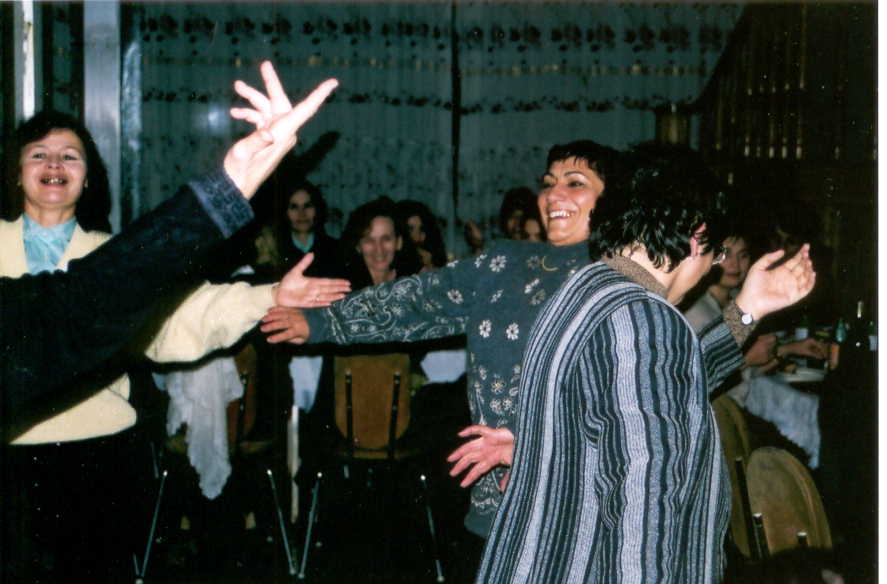 |
Advanced Training of Trainers (ATOT)
IDEE organized a five-day workshop taught by a
multinational
group of experienced trainers. The ATOT focused on giving additional
skills
to the team of nine trainers (three from each country) who carried out
three training workshops for NGO activists during the previous year.
The
workshop attempted to provide them with the basic capacity to train
new,
less experienced trainers, especially in ways of organizing and running
Citizens’ Forums. A number of trainers were selected to assist in
leading
the subsequent Training of Trainers program. |
Training of Trainers (TOT)
As a follow-up to the ATOT, IDEE organized a five-day
workshop for 27 new activists (nine from each country) on the
facilitation
skills for leading community forums as well as on basic training skills
in their own communities and across borders.
U.S.-based Study Tour on Conflict Resolution
Techniques
Six women (two from each country) participated in an
intensive
two-week program entitled “Coalition-Building Through Conflict
Resolution.”
The Washington, D.C.-program consisted of one- and two-day workshops,
one
run by the United States Institute of Peace, meetings, and site visits
to organizations working on similar issues in the context of
inter-ethnic
and cross-border coalition-building, as well as meetings with funding
organizations
working in the Caucasus. As a result of the study tour, USIP and IDEE
collaborated
on a series of Caucasus (and then Central Asia) on-site workshops.
Community and Cross-Border Forums
Working with IDEE, the regional NGO partners arranged
a series of six community forums (two in each country) based on the
American
town hall meeting model but adapted to fit the needs of post-communist
countries. Trainers from the TOT workshop organized and moderated the
forums,
which involved community and NGO leaders together with local
officials
and experts in a dialogue on community needs.. Trainers facilitated
public
discussions on important issues affecting these communities and
assisted
community members in proposing solutions to these problems. Following
the
community forums, trainers organized three cross-border forums, which
were
similar in format but concentrated on issues requiring cross-border
cooperation
and coalition-building (refugee issues, e.g.). Participants in the
U.S.-based
program on conflict resolution took part in the cross-border community
forums in order to apply the skills they developed in the U.S.
NGO Newsletter
A quarterly NGO newsletter was launched to encourage
broader
cooperation among NGOs in the region and promote the systematic sharing
of information. All previous participants in the program were invited
to
submit articles on their activities, allowing other NGOs to learn from
their experiences and initiate similar programs in their own
communities.
The newsletter was distributed primarily by e-mail and posted in
Armenian,
Azeri, Georgian, and Russian on the internet, but copies for each
country
were also printed in the regional language and distributed to those
without
internet access. IDEE and its NGO partners selected an editorial board
that will eventually serve as a permanent coordinating structure for
networking
women in the Caucasus.
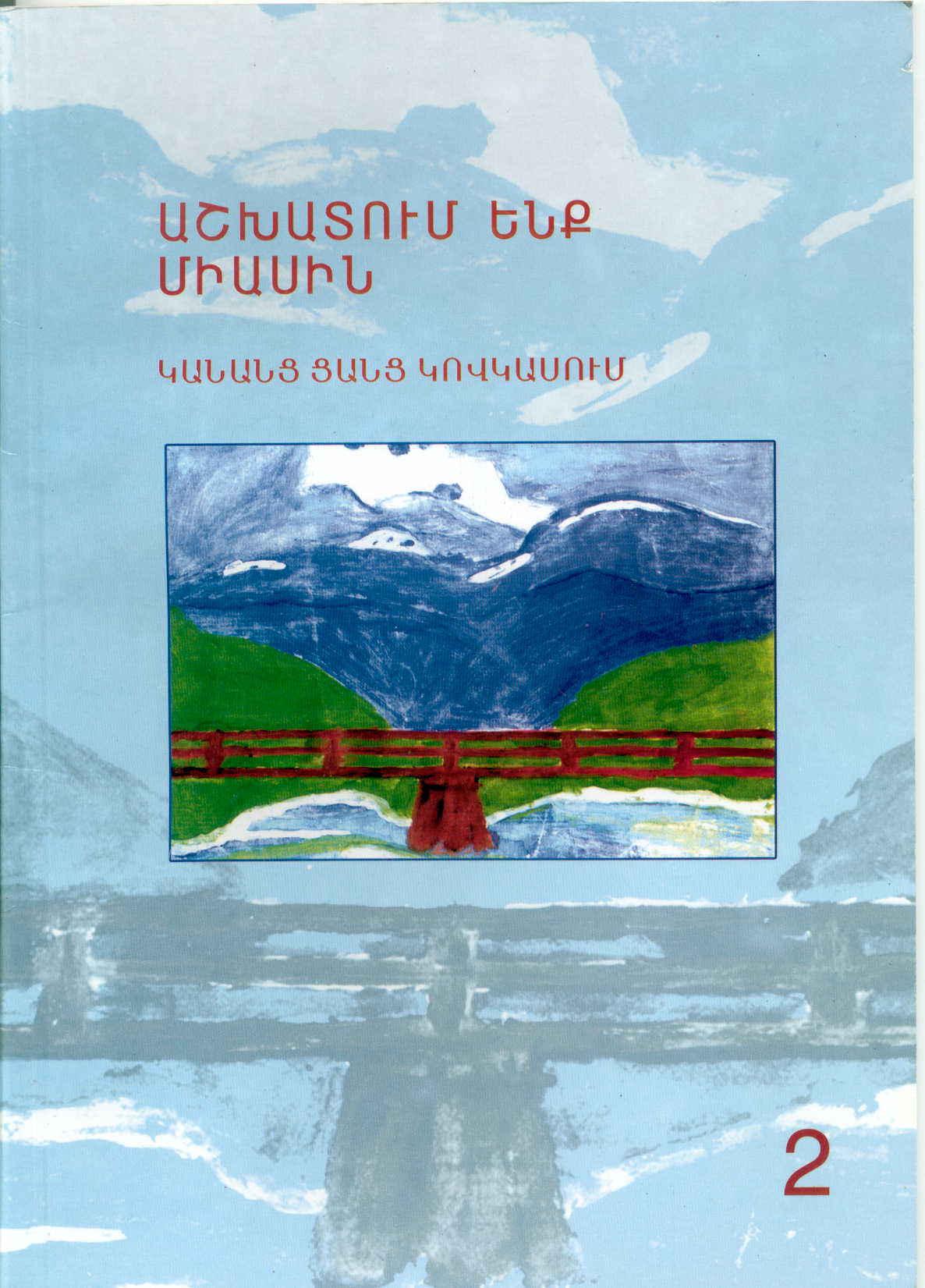 |
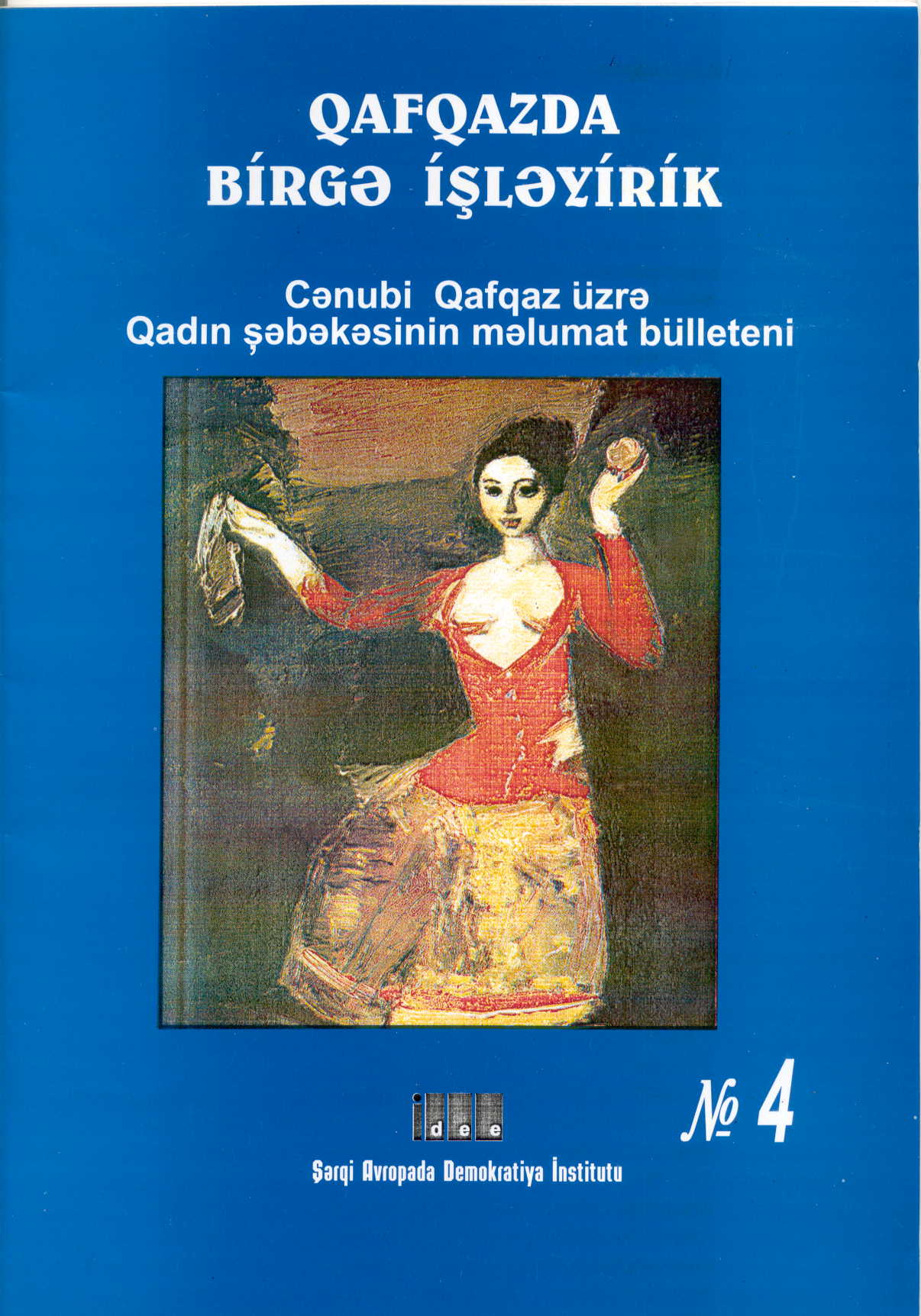 |
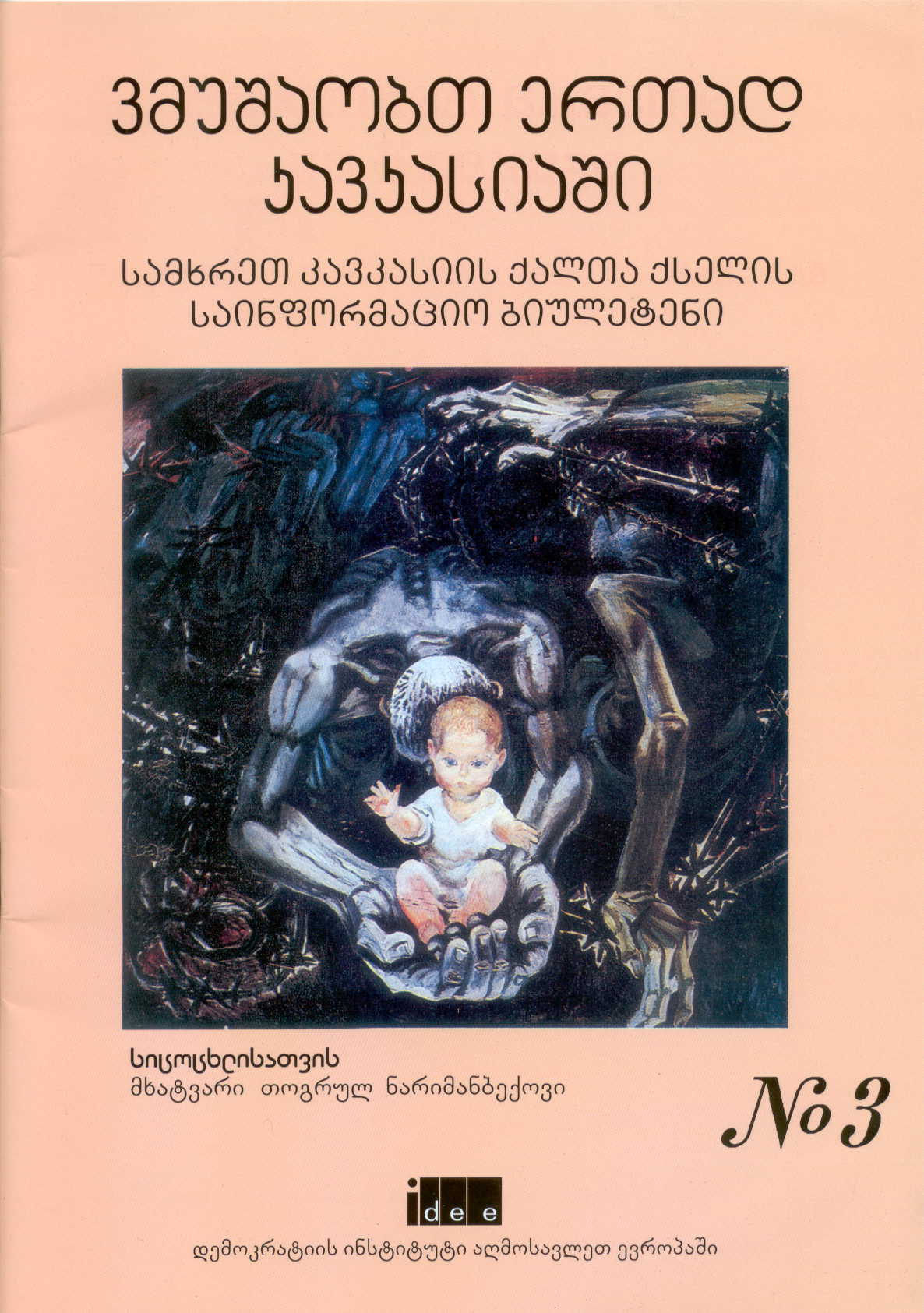 |
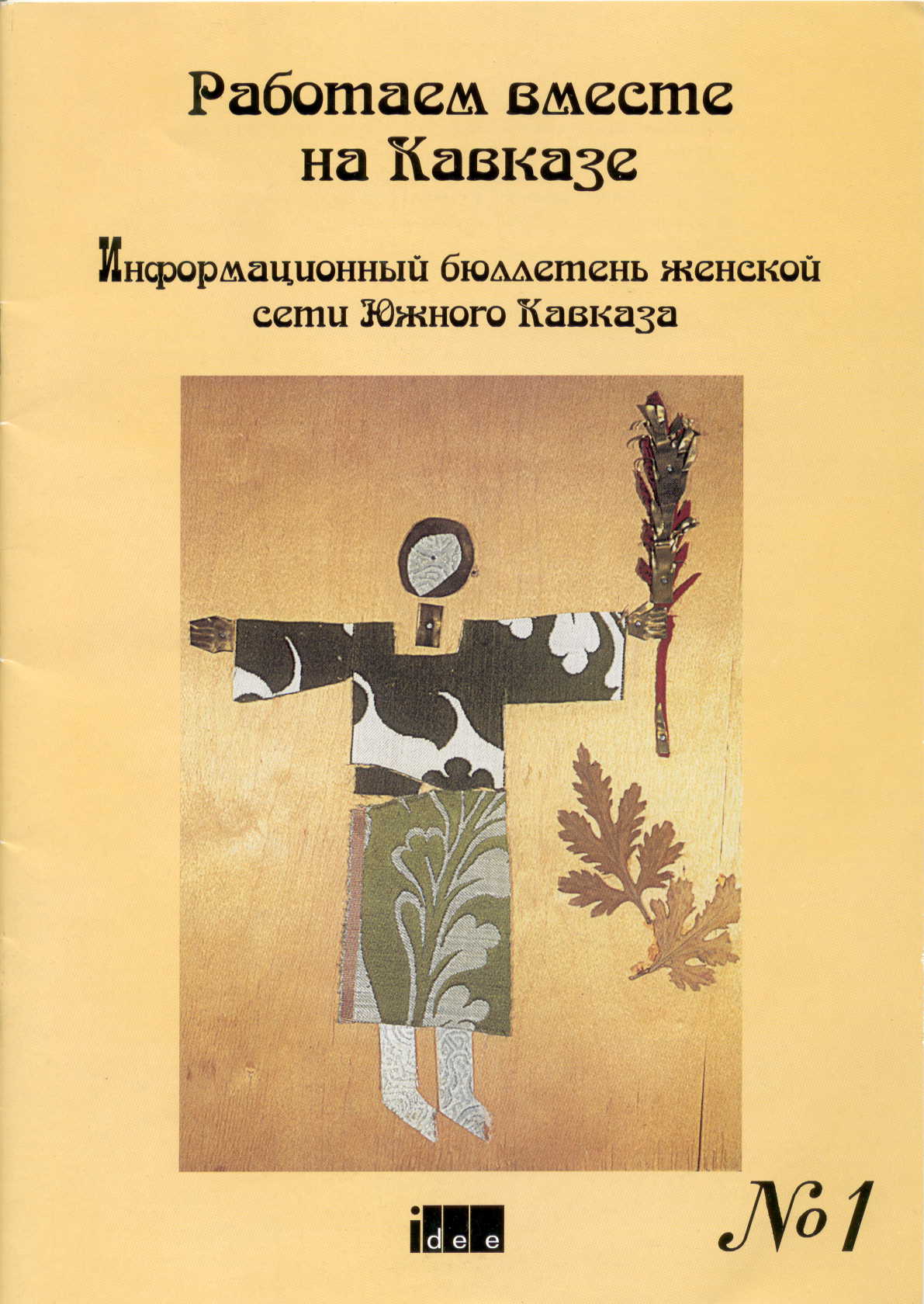 |
|
Armenian language
|
Azeri language
|
Georgian language
|
Russian language
|
While funding for the Women’s Networking in the
Caucasus program
was discontinued after three years, the participants in it have
maintained
the network, continuting to publish the NGO Newsletter, participate in
cross-border programs, organize training for women NGO leaders, and
carry
out other initiatives.
What
is Idee? | Programs
| Publications | Photogallery
| Useful Links | Contact
|





